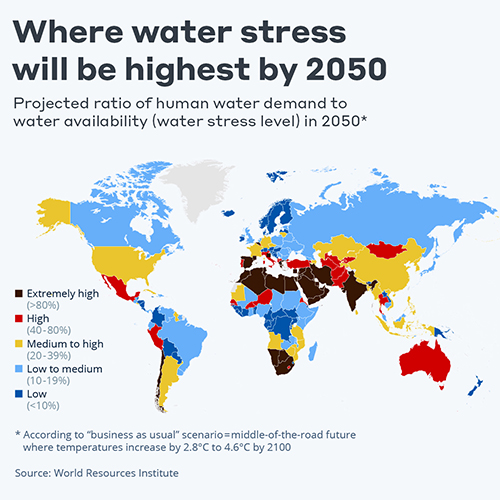The Gulf Cooperation Council (GCC) region is anticipating a significant surge in water demand driven mainly by the rapid urban and economic development across its countries. This growth has already triggered a strong focus on enhancing the functionality and efficiency of the water sector. From the pioneering efforts of the United Arab Emirates in aquifer recharge to Saudi Arabia's comprehensive water sector reforms, the region is cultivating a wealth of expertise in developing innovative and sustainable water solutions. These achievements position the GCC region on the path to becoming a valuable knowledge hub for other water-stressed regions seeking to enhance their water security and overall water sector resilience.
A prime example of this regional focus is Saudi Arabia's substantial investment in water and wastewater infrastructure, which presents a lucrative opportunity for businesses seeking to participate in the Kingdom’s development trajectory. The Saudi Water Partnership Company (SWPC) is at the forefront of this ambitious agenda, aiming to privatise desalination by 2030 fully. The increased involvement of the private sector is expected to accelerate the deployment of cutting-edge technologies, improve operational efficiency, and drive down the cost of desalination and desalinated water. Ultimately, these efforts will contribute to the Kingdom's economic diversification goals while safeguarding its water resources for future generations.

Source: Statista 2024
However, accelerating progress on water resilience requires more than individual country-level initiatives. It necessitates enhanced collaboration across the GCC region and the water industry, alongside the adoption of innovative approaches and cutting-edge technology. This article will delve into the importance of collaborative emergency support for water resilience, highlighting how joint efforts and technological breakthroughs can fortify the region’s water sector against future uncertainties.
Fostering Resilience through Collaborative Emergency Support
Fostering robust partnerships with water sector personnel through ongoing engagement, comprehensive needs assessments and strategic capacity development is essential for building resilient water infrastructure. Collaboration, when combined with a culture of continuous improvement, can enhance the region’s capacity to adapt to evolving challenges. For this to happen, government agencies, water utilities, communities, and other stakeholders need to join forces, focusing on saving the limited water resources, adopting water recycling initiatives and championing inter-region collaboration to help our communities not only withstand severe events but also thrive in the face of adversity.
One way to bring this collaboration to reality is by establishing a comprehensive emergency support system that is equipped with resource inventories for vital equipment. Resources such as portable generators, bypass pumps, variable frequency drives and operator exchange programmes are critical for ensuring uninterrupted water services during severe events such as heavy rainfall or power outages. By investing in these areas, water utilities can significantly improve their ability to deliver reliable water services, mitigate risks, and safeguard the community's well-being.
To optimise the effectiveness of these systems, it is crucial to conduct regular evaluations of their impact and make necessary adjustments. Incorporating feedback from water sector personnel and other stakeholders is essential for ensuring that the support system remains aligned with the evolving needs of the sector. Additionally, exploring opportunities for public-private partnerships can bring in additional resources and expertise, further strengthening the water sector's capacity to respond to emergencies and deliver high-quality services.
Supplementing these efforts with targeted training initiatives for superintendents and operators in areas such as health and safety, operational procedures, and emergency response protocols further enhances the sector's capacity to effectively manage challenges and protect public health.
Innovation is a Strategic Imperative
Beyond establishing robust emergency response mechanisms and fostering strong partnerships, innovation and technology can play a significant role in accelerating our progress to water security.
Cutting-edge technologies can significantly enhance operational efficiency and resilience. For instance, advanced monitoring systems, predictive analytics, and real-time data management tools can provide invaluable insights into system performance, enabling proactive decision-making and early intervention in case of anomalies. A comprehensive Drinking Water Watch database is a key tool for ensuring the long-term safety and reliability of public water supplies. By systematically compiling and analysing Consumer Confidence Reports (CCRs) from water treatment facilities, this centralised repository serves as a tool for monitoring water quality trends, identifying potential compliance issues, and informing evidence-based decision-making. A well-maintained Water Watch empowers regulatory agencies, public health officials, and community stakeholders to proactively address water quality challenges, protect public health, and build trust in the water system.
Moreover, a comprehensive database facilitates the identification of emerging contaminants, the assessment of treatment plant performance, and the evaluation of the effectiveness of water quality regulations. By providing a historical perspective on water quality trends, a Water Watch can contribute to the development of early warning systems and targeted interventions to safeguard public health and environmental well-being.
In addition, promoting a culture of continuous learning and innovation within the water sector is paramount. This can be achieved through knowledge-sharing platforms, research collaborations, and capacity-building initiatives. Encouraging experimentation with new technologies and approaches can lead to the development of innovative solutions to address emerging challenges.
Emergency Support in Action
The use of collaborative platforms for emergency support is already being implemented in numerous locations across the globe. For example, in the United States of America (USA) some US states have establishing Web Emergency Operations Centers (WEOC) to facilitate communication and collaboration among strategic partners during times of emergencies and severe events. This has proven to be crucial for time-efficient mobilisation and deployment of resources and boots on the ground.
WEOC helps these states streamline communication between county and state officials during emergencies affecting water infrastructure. This platform facilitates efficient resource allocation by allowing county Emergency Management Agencies to directly submit requests to the State Emergency Management Agency database or WEOC. Alternatively, Emergency Management Agencies can contact the State Operations Center, where an action officer will assign the request to the appropriate agency. All assistance requests are meticulously recorded in the database to ensure accurate tracking and efficient resource allocation. This centralised system ensures that resources are swiftly deployed to the areas most in need, minimising the impact of emergencies on water infrastructure.
Following Hurricane Michael's devastating landfall in October 2018, the State of Georgia's water infrastructure faced significant challenges. To mitigate the impact of the storm and ensure continued water service to affected communities, a coordinated response through Web Emergency Operations Center was implemented. Through efficient communication and collaboration, 176 Total Boil Water Advisories were issued, and 60 generators were strategically deployed by nonprofit partner agencies to support the 108 impacted counties. These timely interventions were instrumental in maintaining the operational integrity of water facilities, preventing further disruptions, and mitigating the potential for disease outbreaks. The successful implementation of these measures demonstrates the power of effective emergency response planning and innovative collaboration approaches. By leveraging the expertise and resources of nonprofit partners, the State of Georgia was able to swiftly address the critical needs of affected communities and minimise the negative consequences of the disaster.
Conclusion:
The GCC region is demonstrating a remarkable commitment to addressing water scarcity through strategic investments, innovative solutions, and policy reforms. By prioritising infrastructure development, human capital development, and technological advancements, the region is building a resilient and sustainable water sector. However, more needs to be done if we are to address the challenges posed by climate change, population growth and dwindling water resources. Creating collaborative systems can help our region enhance emergency preparedness and navigate the complexities of water scarcity.
Ahmed Bakr is a Senior Consultant – Environment & Sustainability in WSP Middle East based in Riyadh, formerly the Emergency Support Functions Lead to the Water Sector in the State of Georgia, Ahmed brings over 18 years of global expertise in identifying water sector needs and working with customers at all levels. Ahmed holds a PhD in Environmental Engineering and have a published research record on advanced methods for water purification, and his regional expertise spans North America including the US and Canada and the Middle East including Egypt and recently Saudi Arabia.
















